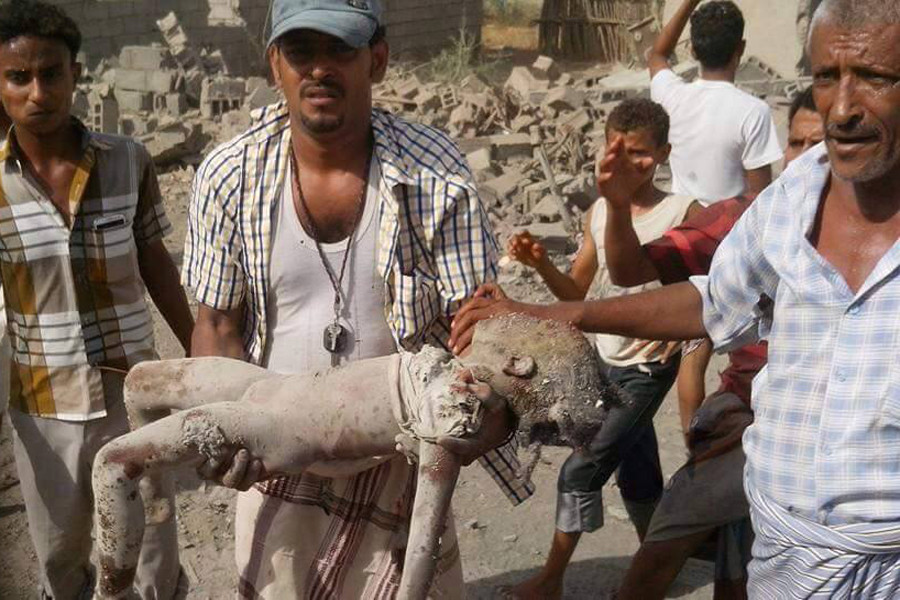SANAA, Oct. 27 (Saba) -A catastrophic war has ravaged Yemen for more than four years, children are dying on a daily basis from bombing or starvation.
The UN reports that more than two million children are malnourished, with one in two now suffering from stunted growth because of food shortages.
The war in Yemen, now in its fifth year, continues to fuel the worst humanitarian crisis in the world. Indiscriminate violence and destruction have wreaked havoc on the civilian population and pushed millions to the brink. Yet it is Yemen’s children who suffer first and suffer most.
In a statement released , Ms. Fore said that “in Yemen, children can no longer safely do the things that all children love to do, like go to school or spend time with their friends outside. The war can reach them wherever they are, even in their own homes.
“Each day, eight children are killed or injured across 31 active conflict zones in the country,” continued Ms. Fore, “talks and conferences have so far done little to change the reality for children on the ground. Only a comprehensive peace agreement can give Yemeni children the reprieve from violence and war that they need and deserve.”
More than a quarter of children are out of school or in need of education assistance, and an estimated 2,000 schools can no longer be used. The journey to school has become so dangerous that parents are keeping their children home for fear of attacks. Without education, the future of millions of children and the country itself could be lost.
Exposure to violence has a lifelong impact on children’s physical and emotional well-being. With little recourse for specialized care, many children will carry these scars into adulthood, with long-term consequences.
Meanwhile, humanitarian access to areas with active fighting has shrunk, leaving trapped civilians more vulnerable to malnutrition and disease outbreaks. Health and sanitation systems have deteriorated, increasing the risk that cholera and acute watery diarrhea will spread.
Simply put, Yemen remains a nightmare for children.
The question now is what can be done to protect Yemen’s children and safeguard the country’s future before time runs out. Any solution must start and end with putting children first.
In this conservative country, girls are often married off young. But as the war has wrecked the economy, they’re being pulled out of school to be married even earlier than before, so their families can get dowry money to put food on the table.
Girls are also more vulnerable to abuse during wartime. There has been a 63 percent increase in incidents of gender-based violence, including rape and sexual assault, domestic violence and forced marriage, since the conflict began, the United Nations says.
Save the Children says it based its figures on mortality rates for untreated cases of Severe Acute Malnutrition in children under five from data compiled by the UN. According to conservative estimates, it calculated that around 84,700 children may have died between April 2015 and October 2018.
Rising food prices and the falling value of the country's currency as a result of a civil war are putting more families at risk of food insecurity.
The UK-based charity blames the blockade for putting more people at risk of famine, with continued heavy fighting around the principal lifeline port of Hudaydah further exacerbating the situation.
parties to the conflict must make every possible effort to keep children safe and to abide by their legal obligations to keep them out of the line of fire — even in areas of active fighting. This also means sparing the essential infrastructure on which children depend, such as health centers, water and sanitation systems and schools.
All parties to the conflict bear responsibility for killing and maiming children and using disproportionate force without consideration for the safety of children and other civilians. Those who have influence over the parties, including members of the U.N. Security Council, have an obligation to use that influence to protect children.
Parties must also allow unlimited imports of humanitarian and essential commercial supplies through all ports of entry to Yemen by sea, air and road, and remove all impediments that delay ground transportation within the country.
Bureaucratic obstacles to the delivery of aid and to humanitarian and commercial imports should be eliminated, and parties should provide sustained, unconditional and uninterrupted humanitarian access to people in need — no matter who controls the areas they live in.
Written by Mona Zaid

| more of (International) |



